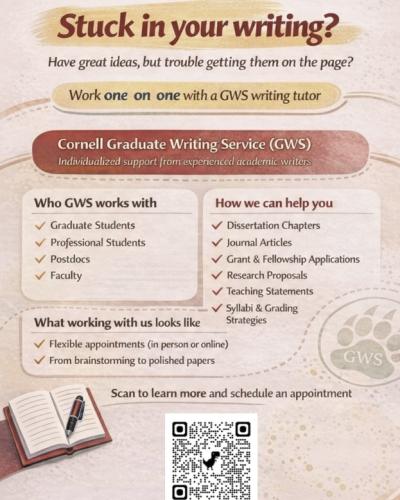Cornell Writes! Tips from our community of writers is a digital newsletter sponsored by the Knight Institute for Writing in the Disciplines and the Cornell University Graduate School.
Each week, a member of our writing community – a Graduate Writing Service, English Language Support Office, or Cornell Writing Centers tutor; a writing specialist from the Knight Institute; a writing instructor from our First-Year Writing Seminars or Writing in the Majors programs; maybe YOU – shares a writing strategy from their own writer’s toolkit. #writelikeabear
Contact Tracy Hamler Carrick with questions and ideas.
Meet Tracy Carrick
Hello Cornell writers! My name is Tracy Carrick. I’m a teacher, tutor, and director of the Knight Institute’s Writing Workshop and Graduate Writing Service. I am also a writer and editor. Right now, I am writing lesson plans, a conference presentation, and feedback on student papers.
Here is this week’s Writing Tip!
If you’ve read our weekly writing tips, you will notice a recurring thread – share your drafts and ideas with others!
This advice seems so simple, too obvious, perhaps. But in my experience with writers – This year is my 30th year in writing centers! – I find my biggest challenges not during my meetings with writers, but rather in my efforts to get writers to schedule and keep appointments. Last year at the Graduate Writing Service, writers canceled or missed 46% of the appointments they scheduled. Forty-six percent!
When I ask the many writers who ditch appointments what happened, their most common responses are that their drafts “were not ready to share” or that they were not able “to get enough or anything written.” And I when I follow up with them after they do finally meet with a writing tutor to ask how their sessions went, they often, far too often, report that they wish they had met with someone sooner.
It's true that writers need to spend a lot of time alone. We need quiet opportunities to hunker down and play in the dirt. We need to immerse ourselves in data and words as we search for ways to grow our gardens. The seeds of our ideas need to germinate. Important work happens in isolation.
I worry, though, when writers sequester themselves in isolation for too long. I’ve been in that too-long state before – unable to see, in some instances, that I was waiting on a seed that would never sprout, and, in others, that I was stunting a promising idea’s growth by providing too few nutrients. The germination stage in our writing rooms (and in our backyards) is precarious: If our ideas don’t have enough time to germinate, they are unlikely to take root, and if our ideas germinate too long, they can rot. But when we time it just right, and a seed breaks out of it’s shell, it’s roots seek nutrition – and fortification.
When writers share ideas and drafts with others, they let in essential nutrients to create a more fertile ecosystem. As Kelly Richmond, former Graduate Writing Service tutor, First-Year Writing Seminar instructor, and Performing & Media Arts PhD candidate explains, “The best writing always emerges out of and then flows back into ongoing conversations.” When writers welcome others into their process, they are often better able to bloom, in Kelly’s words, a “clear, concise and precise articulation of [their] project's innovation and impact.”
And yet writers repeatedly deprive their work of vital care. Imagine the seeds that could have developed into buds and blooms had those writers shown up for those canceled or missed appointments?
I understand why we do it, why writers opt to wait one more day, one more week, one more month. The germination process is indeed precarious. What works for one seed, does not necessarily work for another.
Sharing a draft (or a plan for one) can be stressful. It can make even the most talented, accomplished, and confident writers feel vulnerable, especially when, as is often the case, they seek out feedback only when they are in trouble or when they want to diagnose and fix problems. But sharing drafts and developing ideas should be a comfortable part of the writing process. Sharing drafts and developing ideas – even the roughest, most unrefined – can be exciting, inspiring, and joyful.
Only you can know what nutrients (tools, resources, and feedback) you need to nurture and grow your work, to nudge your ideas and drafts from seed to bud to flower. You are the gardener, after all!
Some writers prefer sharing drafts with friends and family. Others most value sharing drafts with colleagues, disciplinary mentors, and cohort or team writing groups. And while it is true that workshopping ideas and drafts with people who know you and/or your disciplinary or professional areas is valuable, so too might be sharing your writing projects with a broader audience, with “outsiders.” Generalist writing specialists, like those in the Knight Institute’s tutoring programs, can help you see your writing projects differently and may offer alternative ways to approach the writing process or address persistent or situational writing challenges.
If you do choose to make and keep those appointments with our inspiring team of down-to-earth writing tutors (and we hope you do!), here are some of the things you can do to fortify and blossom your writing projects.
Things to do with a writing tutor
Don’t have a draft?
- get started with writing projects and teaching artifacts by brainstorming ideas, planning organizational schemes, evaluating materials, defining research questions.
- review mentor texts (scholarly publications in related fields or target publications) to explore together the kinds of writing moves you might mimic or emulate.
- develop time management strategies and build work plans for completing drafts.
- talk, just talk about your work, what you are doing, why you are doing it, what you hope to accomplish, and how you are accomplishing or plan to accomplish it.
Have a draft?
- explore ways to shape coherent arguments, make strong use of evidence, work with appropriate citation conventions.
- consider questions about depth of analysis, organization, thesis statements, paragraph development, audience expectations, style, sentence structure.
- identify patterns of error in grammar or usage in order to develop effective strategies for line editing.
Things our writing tutors love to do
- “As a tutor, I love to work with writers of all disciplines and in all stages of a project. My strengths lie in argument structure, organization, and issues around language concision and clarity. I ask a lot of questions so my feedback can always be guided by the needs and the agenda set by the writers with whom I am working. Looking forward to working with you!” (Farah Bakaari, PhD Student, Department of Literatures in English, Graduate Writing Service Tutor)
- “I am intrigued by different writing practices and enjoy discussing anything related to the writing process, from brainstorming and writing strategies to work habits, revisions, and editing. I work with students from all disciplines by asking questions and paying close attention to writing patterns. Depending on what the text – and you as its author – need, I focus on the structure of the argument and its flow, word choice and sentence structure as well as signposting and the argument's framework. (Tamar Gutfeld, PhD Candidate, German Studies, Graduate Writing Service Tutor)
- “Throughout my academic training, I have gained experience as an editor, Spanish–English translator, and diction coach. I have edited book manuscripts, seminar papers, and cover letters; translated publicity materials and meeting transcripts; and offered productive feedback on pronunciation and inflection for spoken lectures and presentations. As a tutor, I draw on all of this experience in order to offer a well-rounded approach to writing that can apply to any discipline. If you are looking for help with clarifying an argument, organizing a text, or developing your voice as a writer, I would love to work with you!” Rachel Horner, PhD Candidate, Music and Sound Studies, Graduate Writing Service Tutor, on leave 2023)
- “Although my background is in STEM, I have worked with students from all disciplines. I enjoy working with students at all stages of the writing process from brainstorming ideas to final revisions. My biggest strengths lie in constructing arguments, organizing essays, and writing for intended audiences. English is my second language, and I understand the needs of multilingual writers.” (Raunak Sen, PhD Candidate, Neurobiology and Behavior, Graduate Writing Service Tutor)
Write with us!
Follow these links to learn more about the Knight Institute’s tutoring programs.
- Graduate Writing Service for graduate and professional students, postdocs, and faculty
- English Language Support Office Tutoring on Writing and Presentations for graduate and professional students and postdocs
- Cornell Writing Centers for all writers





